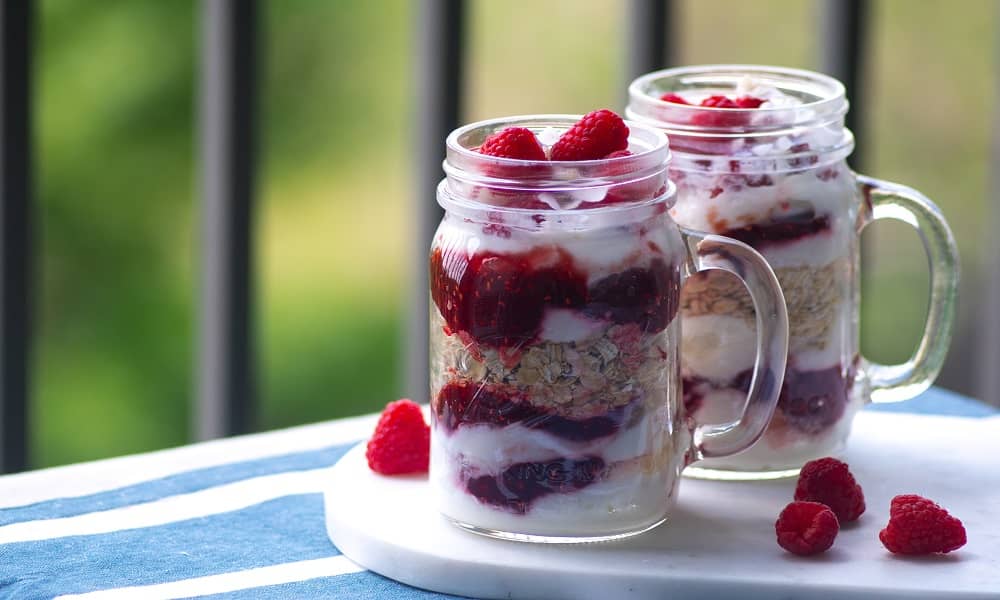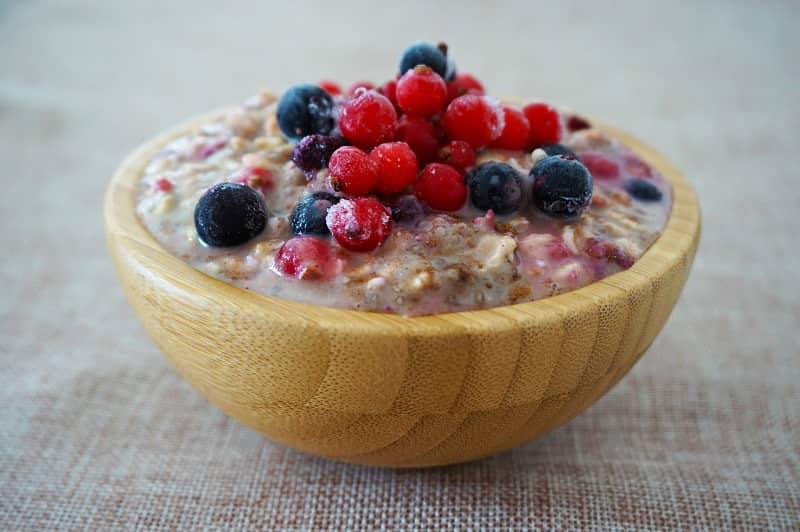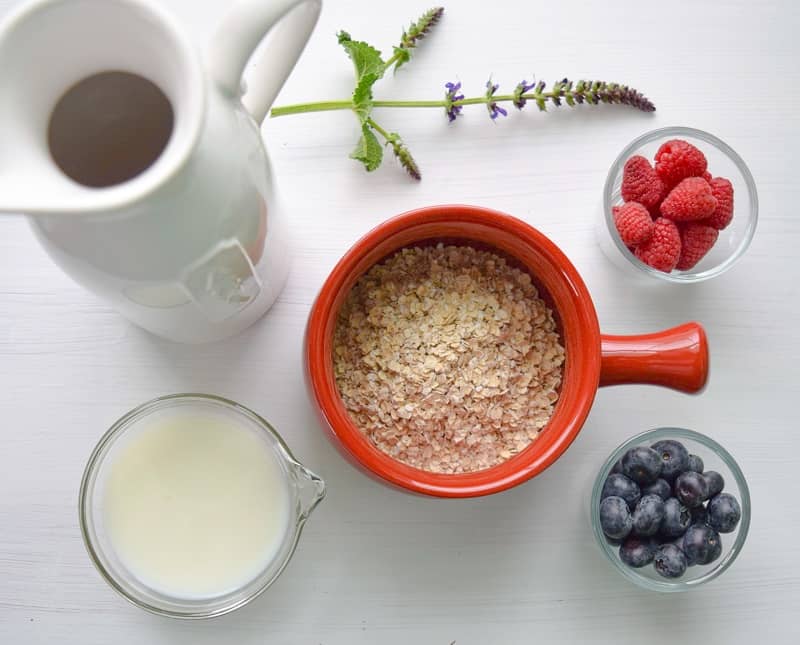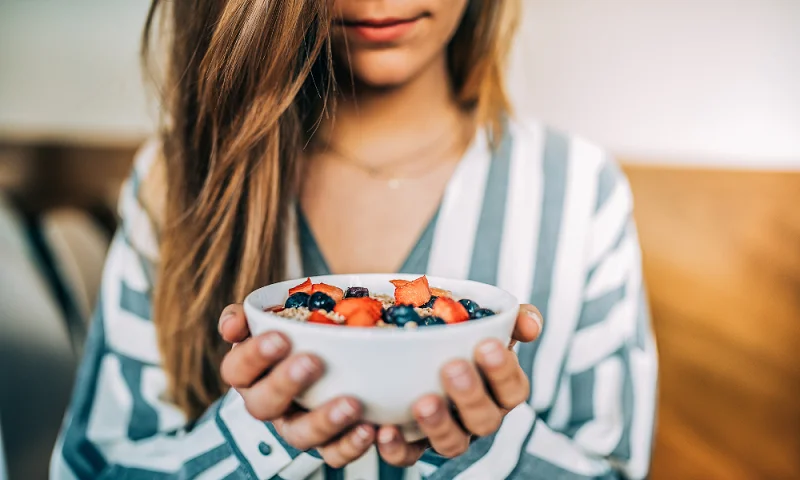
01 Jul Overnight Oats, Phytic Acid, and Its Safety: All Questions Answered
A proper soak allows overnight oats to deliver maximum nutrition and make it safer.
Which is better: overnight oats vs oatmeal? Chances are you’ve been wondering about this if planning to start eating overnight oats each morning!
And while a piping hot bowl of oatmeal is satiating, refrigerated overnight oat has its own appeal in terms of convenience and taste.
The best part?
The procedure to prepare overnight oats is pretty straightforward. And when you follow the preparation method we mention right below, you also make it safer to eat and preserve.
Just soak the oats at room temperature for about 4 hours before tossing the container in the refrigerator. That’s it!
Soaking the oats at room temp or a slightly warmer than room temperature before refrigeration actually gives you a better nutritional profile by allowing the growth of some beneficial microorganisms.
And refrigeration after the 4-hour mark will slow down the fermentation and keep the oats from getting spoilt.
Eat the overnight refrigerated oats with the toppings of your choice the next day or days after, given you refrigerate or freeze the soaked oats properly. More on this later.
All in all, overnight oats are a nutritious food to incorporate into your overall diet as long as you keep the toppings and mix-ins in accordance with your health goals.
Here’s a complete breakdown of how you are actually supposed to eat overnight oats to maximize nutrition.
Are Overnight Oats Safe to Eat?

Overnight oats are uncooked oats that have been soaked overnight or longer in a liquid of your choice.
How long do overnight oats need to sit?
Allow about 12 hours of overnight soaking altogether. This will reduce the phytic acid content in oats, making it easier for you to utilize the maximum nutrients the next morning.
When it comes to the liquid used to soak the whole grain oats, you have a lot of possibilities.
Milk, soy milk, nut milk (almond, cashew), water, coconut milk, and hemp milk are all popular options.
Though, overnight oats with yogurt deserve a special mention here.
Many people are keen on trying fermented oats soaked in yogurt overnight. Well, if you’re doing this solely to reduce the phytic acid, you’re better off soaking your oats in just plain water.
Reason?
According to Monica Reinagel, a US-based nutritionist, while lactobacillus bacteria and acidic mediums break down phytic acid, calcium can block the enzymatic breakdown of phytic acid.
She also mentions that mineral deficiencies caused due to too much phytic acid is primarily a concern for those with nutritionally deficient diets, and it’s not something everyone should worry about.
What About Fermented Overnight Oats?
Well, in order to ferment your oats outside the fridge, you’ll have to submerge and leave them soaked at room temp or warm liquid for 12 to 24 hours.
However, this duration largely depends on the room temperature.
There’s a chance that you may end up leaving the soaked oats out for far too long without the proper knowledge of fermentation and the required temperature, which might make the oats inedible.
Furthermore, you can cook it after leaving it out for fermentation, but then that will defeat the purpose of overnight oats.
That’s the reason it’s advisable to not leave out oats soaking at room temperature for more than 5 hours before refrigeration. This way you will slow down the speed of fermenting the grains and prevent bacterial overgrowth.
Moreover, lemon or apple cider-flavored overnight oats are savory choices if you tend to favor the sour and tangy taste of fermented overnight oats. You can also use yogurt or kefir for a flavorful addition.
Moving on to the choice of oats, steel-cut oats, rolled oats, and quick oats are the three most popular types of oats available.
However, rolled oats are the ideal sort for making overnight oats because they are healthier and produce better results when soaked.
So, yes, overnight oats are safe to eat when prepared this way.
Overnight oats are, in fact, a healthy meal prep option. Whole grain oats are the main ingredient, and they carry a multitude of health benefits.
Here are five good reasons why overnight oats are safe to eat and can benefit your health immensely:
- The Improved Digestibility of Overnight Oats
- Increased Resistance in Overnight Oats Starch
- Overnight Oats is Easy to Use in a Variety of Recipes
- Overnight Oats Save Time and Money
- Oats Kept Overnight Taste Great
Moreover, it’s completely a treat to eat if the raw dry oats have been properly hydrated and soaked for at least 12 hours.
Bonus! Soaking oats also aid in digestion, making it more suitable for gluten intolerant people.
Well, a single search for “Are overnight oats safe Reddit” will likely return a number of results from people who have been enjoying overnight oats.
The best part is there are a number of ways to make your delicious bowl, and most of them fit into a busy schedule.
What is the Best Way to Make Overnight Oats?
Combining four ingredients in a jar or bowl and letting the mixture sit overnight in the fridge is all it takes to make this quick breakfast.

The following is a list of the ingredients you’ll need:
#1. Overnight Oats Soaking
Basic Overnight oats are traditionally made with old-fashioned (rolled) oats. Quick oats or instant oats should not be used since the texture will be unpleasant.
Make this recipe with steel-cut or rolled oats, which have a considerably chewier texture. Soak the oats for at least 12 hours, though.
Note: Overnight oats phytic acid can be reduced by soaking oats overnight.
Proper soaking can help in the reduction of phytic acid by activating phytase (a type of enzyme). By neutralizing the anti-nutrient, you can aid mineral absorption. And as the phytic acid is broken down enzymatically, there’s no harm in consuming the liquid you soaked the oats in.
#2. Solvent Used
You can use whichever milk you choose. Dairy, almond milk, soy milk, coconut milk, pea milk, and cashew milk are all good options.
We don’t recommend using water if the flavor and creaminess of the oats are essential for you.
#3. Sweetener
Sweeten your overnight oats with pure maple syrup. Honey, brown sugar or coconut sugar can also be used. To make a sugar-free breakfast, reduce the amount of sweetener or leave it out entirely.
#4. Extracts
Vanilla Extract is the secret ingredient, and we strongly advise you to not leave it out!
Just a smidgeon of vanilla extract added to overnight oats before soaking them overnight makes a tremendous change in flavor. The essence offers a hint of vanilla for mild sweetness.
#5. Optional Add-Ons
You can use only the ingredients listed above, or you can add more to your jar of oats. To prepare overnight oats with yogurt, whisk in some high-protein Greek yogurt.
Almond butter or peanut butter are also excellent sources of protein. For added nourishment, add chia seeds, flax seeds, or hemp seeds.
#6. Toppings
Add your favorite toppings in the morning and enjoy!
Fresh berries, sliced bananas, or peaches are all good options. Almonds, pecans, walnuts, pepitas, chia seeds, and sunflower seeds, for example, add a delightful crunch. One of the favorite toppings for many is toasted coconut.
A Special Mention:
Take a minute to see which toppings will jell with overnight oats. You might be better off adding dried fruits and chia seeds instead of fresh fruits at the time of refrigeration. Plus, you can always add fruits, nuts, or other toppings of your choice before eating the overnight oats.
Normally, the overnight oats expiration date is after four days, making them a wonderful alternative for meal prep breakfasts.
What is the Best Time to Eat Overnight Oats?
There’s no need to exclude overnight oats entirely from your diet. They can, in fact, be a nutritious and filling part of a balanced diet.
It’s all in the timing, though. The ideal time to take carbohydrates is later in the day, which goes against the classic rule of breakfast.
The thing is a carb-rich breakfast can easily go overboard in its amount of glucose. And all the glucose that’s left to be used up as energy often gets stored as fat.
Thus, it’s probably ideal to have a balanced breakfast with protein and healthy fats along with carbs.
So, if you do eat overnight oats as breakfast, add in some protein in there as well.
Or, if you think you can have overnight oats any time of the day, having them at times other than breakfast is also an option.
Eating overnight oats for dinner may sound unusual, but they’re a delicious, safe, and healthful dinner choice. If you’re going to eat overnight oats, it’s ideal to do it around four hours before bedtime to get the most benefit.
Are Overnight Oats Good for Weight Loss?
One of the best sources of resistant starch is overnight soaked oats. Oatmeal has a number of advantages, including the ability to burn abdominal fat.
This form of starch takes a long time to digest. As a result, you will feel more satisfied and have fewer hunger pangs.
Furthermore, oats activate the release of several digestive acids that reduce appetite and increase the calorie-burning rate.
As a result, overnight oats are safe to eat when combined with healthy add ons and can undoubtedly assist you in losing weight.
Benefits of Overnight Oats When Cooked the Right Way?
Cooking your bowl of overnight oats the right way is actually the secret to enhancing not only its tatste but also the health properties. This portion of the blog will discuss some of the advantages of overnight oats when cooked right:
#1. You’ll Be in a Better Frame of Mind
Resistant starch, a form of prebiotic fiber that the body does not digest, is abundant in overnight oats. As a result, it goes through your digestive system without stopping until it reaches your intestines.
The gut bacteria then ferment the fiber, which aids in the creation of a healthy gut environment. And, thanks to the gut-brain axis, a healthy stomach leads to a better mood.
#2. You’ll Be More Consistent
You’ll be able to go to the bathroom with ease thanks to the fiber content in overnight oats—as long as you don’t have any other underlying concerns.
#3. You’ll Feel Fuller for Longer
The satiating quality of overnight oats—due in part to all that fiber—will provide you with enough energy to get you through your morning and avoid the dreaded hunger pangs.
#4. You Might Be Able to Slim Down
Switching to overnight oats—which contain just about 200-300 calories per half-cup could result in weight loss after a few weeks of sticking to this new routine.
#5. You’ll Improve Your Heart Health
Switching to overnight oats reduces the number of saturated fats you consume each day, which may help to improve heart health over time.
Overnight Oats – Q&As

Here’s everything you need to know before making your first batch of overnight oats.
#1. What to add to overnight oats?
You can take a bowl and fill it in with rolled oats, a liquid (yogurt, milk, water, etc.), Syrups (like maple for sweetening), and toppings (dried fruits, chia seeds, nuts, etc.)
#2. How to add more protein to overnight oats?
You can add proteins by soaking oats in high-protein glasses of milk (soy or skim) or by adding cottage cheese, nut powders, ground flax, and chia seeds.
#3. Are overnight oats fattening?
Overnight oats can be fattening if the mix-ins and toppings utilized are heavy in fat. If you choose healthy ingredients, overnight oats can be a filling and nutritious supplement to your daily meal without the extra weight gain.
#4. Are overnight oats digestible?
Yes, it’s highly digestible when you soak it properly beforehand.
#5. Is it safe to eat overnight oats everyday?
Yes, it is safe to have overnight oats every day as it provides several health benefits like low blood sugar and reduced constipation.
#6. What happens to your body when you eat overnight oats?
Oats that are soaked overnight are more digestible and have reduced phytic acid. This indicates that you are absorbing more nutrients from your food.
#7. Is it bad to eat overnight oats every morning?
There’s nothing bad with eating overnight oats every morning if you want to feel filled and burn more fat.
#8. Are overnight oats healthier than cooked oats?
Overnight oats are healthier than cooked oats.
As opposed to a slow-cooking technique that involves soaking oats for an extended period of time, the process of heating oats is typically thought to be less nutritious for oats.
#9. Do overnight oats need to be refrigerated?
Yes, keeping the soaked oats in the refrigerator is important to prevent them from going bad. Because overnight oats can last for about 4-5 days in the fridge, you can make a batch and keep it refrigerated until you finish it.
#10. How long do overnight oats take in the fridge?
Allow at least 12 hours of soaking to break down the phytic acid and improve digestibility.
#11. Can you freeze overnight oats?
Yes, overnight oats can be frozen for up to three months. Keep Individual containers in the freezer for a simple grab-and-go option.
#12. Do overnight oats cause gas?
Yes, overnight oats can cause gas. Fiber, raffinose, and starch are all found in whole grains like wheat and oats. Bacteria in the large intestine break down all of these, resulting in gas.
#13. How long can overnight oats last in the fridge?
Overnight oats can last for up to a maximum of 5 days in the fridge.
#14. Do overnight oats have more fiber than cooked oats?
Yes, overnight oats contain more fiber as well as more protein.
#15. How can you tell if overnight oats are bad?
There are simple ways to check whether overnight oats have gone bad or not. They are:
- Mold: If mold appears on the surface of your overnight oats, toss them out.
- Unpleasant odor: Give the oats a sniff test to see whether they’re ready to eat. Don’t consume them if they smell bad.
- Discoloration: If your oatmeal has any strange spots, don’t jeopardize your health by eating it.
#16. How far in advance can I make overnight oats?
Overnight oats are a quick and healthy breakfast that you can prepare ahead of time to save those precious minutes in the morning.
Make as many servings (each in a separate jar) as you’d like using different recipes. However, keep it for no more than 5 days in the refrigerator and 3 months in the freezer.
#17. Can you leave oats in milk overnight?
Yes, you can keep oats in milk overnight. This will help in breaking the starch faster, and it makes the consumption easier, making the oats more chewy, creamy, and soft.
#18. Do overnight oats have to be airtight?
Yes, an airtight seal is better. This ensures your overnight oats stay fresh if it’s stored for more than a day.
An airtight container also helps avoid making a mess and makes storage and portability easier.
Look for one that seals by locking into place. It should also be leak-proof.
#19. What do overnight oats taste like?
Overnight oats have a distinct flavor from conventional oatmeal, owing to the fact that they are served cold. Although cold oats may not appear to be a soothing meal, they are actually quite refreshing in the summer.
#20. Can large flake oats be used for overnight oats?
Overnight oats are best when you make them using old-fashioned large flake oats. Don’t use quick-cooking or instant oats since they can turn mushy.
#21. Do overnight oats make you bloated?
Yes, there’s a chance of bloating with raw overnight oats.
#22. Are overnight oats safe during pregnancy?
Oats are a fantastic snack, and they’re especially good for sensitive stomachs during pregnancy.
They are high in fiber, which helps to prevent constipation, and it also supports a healthier cardiovascular system.
However, definitely don’t eat overnight oats that are kept for days before consumption, especially if you’re pregnant. Also, follow the aforementioned proper preparation process to reduce phytic acid.
#23. Are there any health concerns with overnight oats?
Overnight oats are a healthy food option and one can eat them daily. Only those who have a stomach issues should avoid it as the starch and fiber content in it can lead to bloating and gas.
#24. How do you remove phytic acid from overnight oats?
To remove phytic acid from the oats, you need to soak them in liquid for at least 12 to 16 hours. Don’t forget to add a little bit of probiotic like yogurt as it helps in breaking down the acid. Those who are not comfortable with dairy can go with apple cider vinegar.
#25. Are overnight oats good for gut health?
Oats are rich in fiber that are known to help improve digestive health. They prevent constipation and keep everything running smoothly. Additionally, they are also a good source of healthy gut bacteria, which improves gut health.
#26. Why put chia seeds in overnight oats?
Chia seeds are a rich source of protein, fiber, and healthy fats. Adding them to oats will enhance their nutritional value. Additionally, they also provide a thick and creamy texture to the oats.
#27. What is the science behind overnight oats?
Soaking oats overnight is the practice of making them more healthy and nutritious as it helps to remove phytic acid from them. Also, this practice breaks down the starch naturally, which makes it easier to absorb the nutrients in oats more efficiently.
#28. What not to add in overnight oats?
There is no such rule as to what to add or what to not add to the overnight oats. But if you wish to keep it healthy, then try to avoid adding high-sugar toppings like chocolate and syrup.
#29. Why are Overnight Oats made in a Jar?
Jars are one of the most popular container types to soak oats as they are inexpensive and also convenient. However, they are not the only option. People use many different types of containers to make overnight oats.
#30. What is the best liquid for overnight oats?
Milk and water are the two most commonly used liquids for making overnight-soaked oats. You can choose any one of them according to your preference as some people have problems with dairy products.
#31. Do you stir overnight oats before putting them in the fridge?
Stirring the oats before putting them in the fridge is not a hard and fast rule. You can do it if you want it. The process will not have much of an effect on the nutritional value of oats.
#32. Can you make overnight oats without a Mason jar?
Yes, you can make oats without the Mason jar. Many people rely on different containers like plastic jars to make their overnight-soaked oats.
#33. Are overnight oats harder to digest than cooked oats?
No, overnight oats are not harder to digest. It is much easier on the stomach because of the reduced phytic acid and simpler starches.
Hopefully, now you know how to prepare and enjoy a bowl of overnight oats while harnessing maximum benefits out of this hearty breakfast meal. If your question was not answered, feel free to leave it in the comments down below.



No Comments